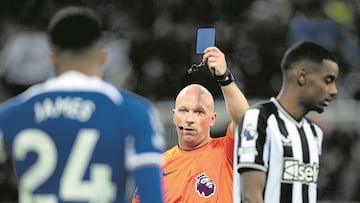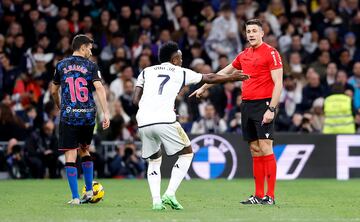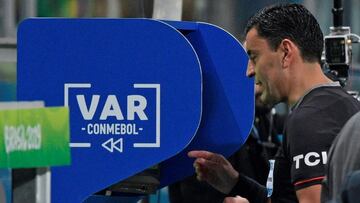SOCCER
How football would look if the blue card were to be introduced
Body cameras and referee protests will be on the agenda when IFAB meet in Glasgow on Saturday 2 March.

The IFAB (International Football Association Board) is set to hold an historic General Assembly this Saturday in Glasgow (Scotland) with the blue card (temporary expulsions) as one of the hot topics to be discussed.
On the table for the members who govern the rules of football is the intention to deal strictly with protests and disrespectful behaviour by players and coaches. A decision must be made on whether to approve the rule that the captain of a team is the only one allowed to approach the referee. Any other protest would carry a yellow card.
When could a player receive a blue card?
Another item on the day’s agenda concerns the famous blue card. Temporary sanctions (ten-minute send-offs) to players and goalkeepers for actions that cut off a promising attack (but not enough to be red) or excessive protests to a referee.

Referee body cameras to be trialled
After being tested in grassroots soccer, it must be given the go-ahead to be tested at a higher or professional level and the protocols to apply it. FIFA, in the face of the noise generated, lowered the expectations of the IFAB advisory control panel and its introduction, as of today, is not confirmed.
These are not the only changes to be discussed by the IFAB this Saturday. Referees have been successfully testing body cameras in amateur soccer, which were introduced to, according to the IFAB website, improve participant (player and coach) behaviour towards match officials” as well as “afford the match officials some safety and protection”. As a result, body cameras may soon be seen in professional football.
Further additions to semi-automated offside technology to help referees on the field speed up decision-making is another of the IFAB’s tasks. There seems little doubt after the positive performances during trials at FIFA competitions that referee communications of VAR decisions to the entire stadium are here to stay for good.

Another hot topic for the IFAB is the continued time wasting in matches. Strategies to address time wasting in matches and tactics aimed at altering the pace of play will be discussed, including the six-second restriction for goalkeepers, throw-ins and medical care for injuries.
The IFAB will also make changes to Rule 12 of the Laws of the Game, concerning the sanctioning of handballs in which penalties are awarded in the same way as fouls, and to Rule 14 (Penalty), concerning encroachment on the field of play and the position of the ball at the penalty mark.
All decisions passed must be made by a three-quarter majority. IFAB is composed of the four British soccer federations (Scotland, Wales, England and Northern Ireland), each with one vote, and FIFA, which with its four votes represents the remaining 207 federations.





